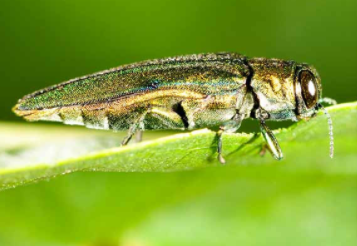|
Woodland Owner Notes E-news
|
Protecting your Forestland Asset
North Carolina Landowner Protection Act
The NC Landowner Protection Act (passed in 2011), does not change general trespass laws nor have any effect on lands which are not posted; the Landowner Protection Act addresses existing trespass law on private property by strengthen and clarifying these elements:
- Defines the requirements for written permission to hunt, fish, or trap on posted lands such that:
- the written permission must be dated within the last twelve (12) months;
- be signed by the landowner, lessee, or agent of that land; and,
- the written consent must be carried in-person while onsite, and provided upon request of any law enforcement officer.
- Allows wildlife officers to enforce trespass laws onsite.
- Allows landowners to post land using purple paint marks and/or by posting no-trespassing signs as currently allowed.
|
2017 Tax Tips for Forest Landowners
by Dr. Linda Wang, National Timber Tax Specialist, U.S. Forest Service
 |
|
 |
Linda Wang: Timber Tax Expert with U.S. Forest Service
|
Each year the U.S. Forest Service publishes a 2-page fact sheet for private forest landowners. The Tax Tips for Forest Landowners for the 2017 Tax Year is available to print for yourself (2 pages).
The U.S. Congress passed the new tax law in September 2017 which provides relief to the taxpayers who are affected by Hurricane Harvey, Irma and Maria this past fall. This link to this refers specifically to that information: Income Tax Deduction on Timber and Landscape Trees Loss from Casualty.
A free webinar is available to anyone interested in hearing about 2017 tax filing for timberland on March 2, 2018. Visit
www.forestrywebinars.net
to attend.
|
 Addressing the Risk to Ash Trees
in our Communities and Woodlands
Emerald ash borer is a tree-killing beetle that has been found in a third of North Carolina counties.
Woodland owners can help protect forestland by
learn about emerald ash borer (EAB) in order to detect and report its presence. Cutting down dead and dying ash trees and chipping, burning, or burying the wood on the site, in accordance with all local regulations, can reduce the chance of other trees being attacked. The NCDA&CS has issued a statewide quarantine to prevent the human-facilitated movement of EAB to new areas such as through transporting firewood.
Municipalities wishing to receive financial assistance in the treatment of individual and ornamental plantings of ash trees should read the
Ash Protection Program guidelines and submit application materials by February 15, 2018. Direct questions to Kelly Oten, N.C. Forest Service, Forest Health Monitoring Coordinator at
kelly.oten@ncagr.gov.
|
Coming Events of Interest to Woodland Owners
February 15, 2018 (Th) - 6:00 PM - Northampton County Annual Forestry Meeting, Jackson, NC. Registration required by calling 252-534-2711.
March 1, 2018 (Th) - 2:00 PM - 3:00 PM. Free webinar on "Native Vegetation Investments Pay Conservation Dividends" featuring Jef Hodges, National Bobwhite Conservation Initiative grassland coordinator. Register and watch from your computer.
October 24-26, 2018 (We-Fr) - The Longleaf Alliance Biennial Conference - Holiday Inn, Alexandria, LA. Details coming soon.
|
Woodland Owner Notes E-news is a monthly email newsletter from Extension Forestry at NC State University. This newsletter is made possible through support from Renewable Resources Extension Act and the National Institute of Food and Agriculture. The 2018 editors are:
Mary Lou Addor, NCSU, Eastern NC Sentinel Landscapes Partnership, Raleigh, NC
Robert Bardon, NC State University, Extension Forestry, Raleigh, NC
Jim Hamilton, NC Cooperative Extension Service, Asheville, NC
Alton Perry, Roanoke Electric Cooperative, Roanoke Rapids, NC
Colby Lambert, NC Cooperative Extension, Lillington, NC
Send Comments to:
Kelley McCarter, at NC State University, Phone: 919-515-9563
|

If you received this email as a
forwarded message,
and like what you see,
please use this handy
button to join the mailing list.
|
|
|
|
|
|